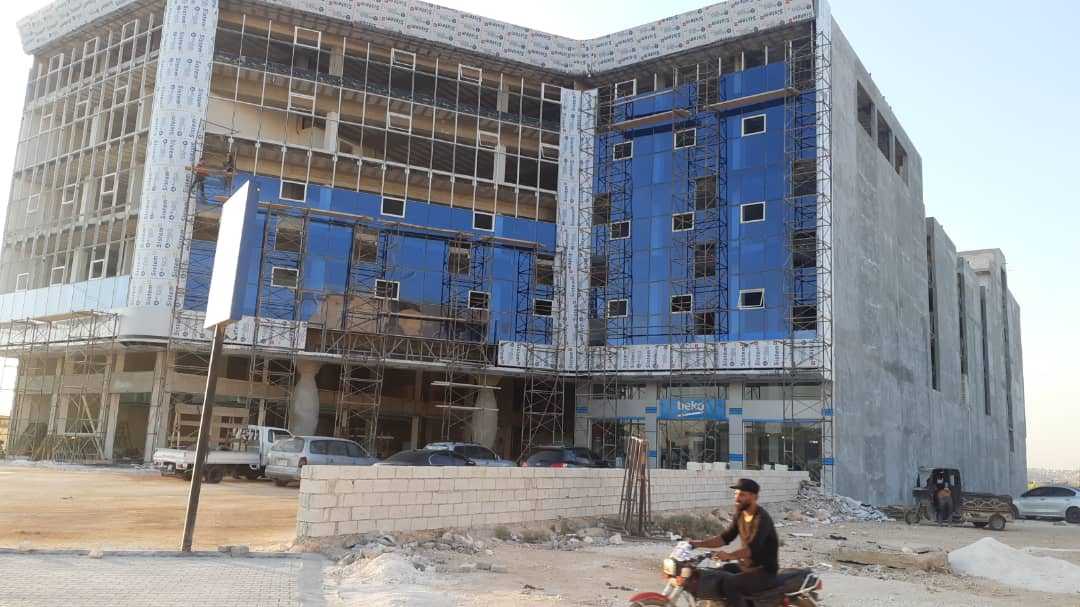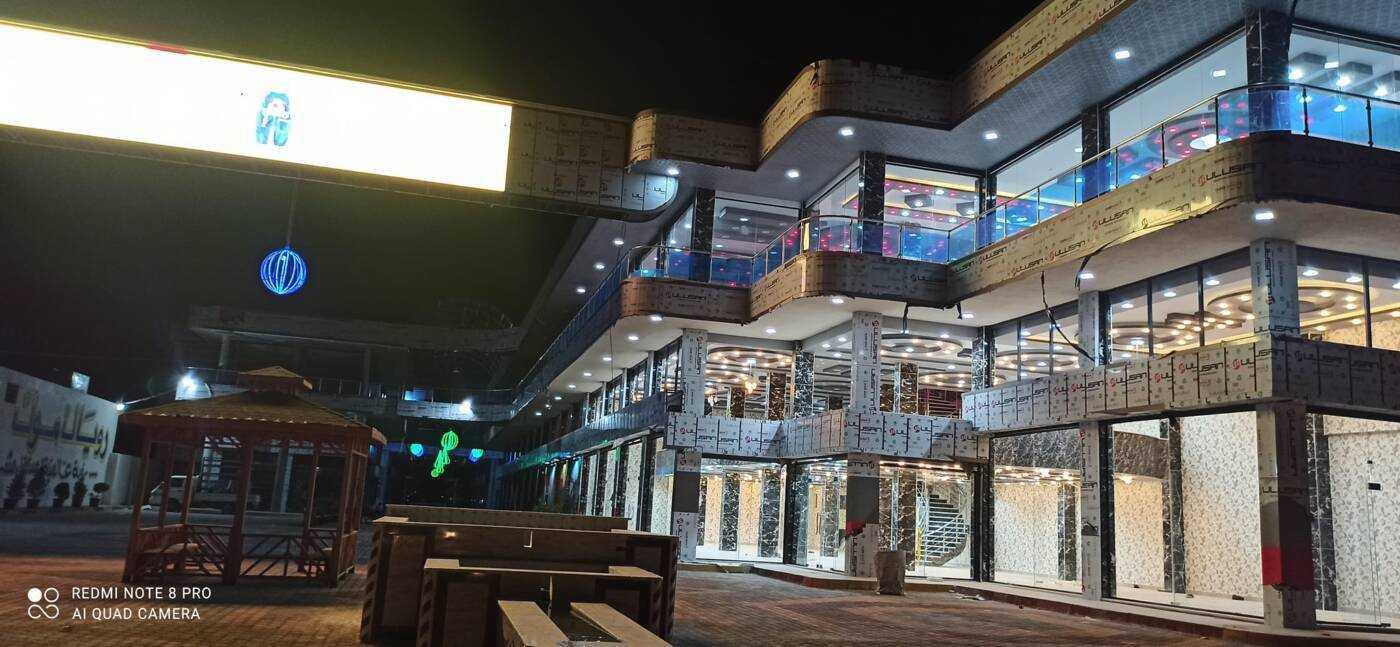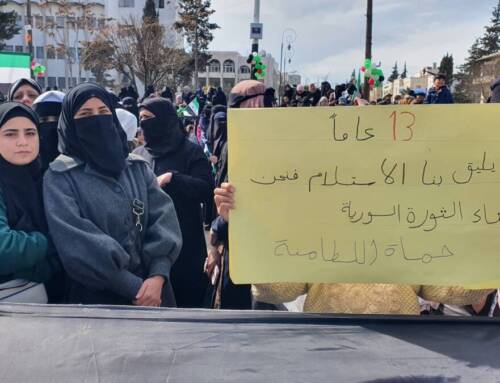Another side of Idlib: Daring investment in ‘huge’ commercial projects
In Idlib, a province often mentioned in the same breath as humanitarian crises and bombings, an urban and commercial revival is underway in some cities and towns as local businesspeople invest in large trade and residential complexes.
9 September 2022
IDLIB — In a part of Syria most often associated with humanitarian crisis, and where around four million people live, half of them displaced, Idlib province is undergoing an urban and commercial revival as large trade and residential complexes are being built, particularly in the cities of Dana, Sarmada and Idlib city.
Syrian regime forces continue to bombard the Hayat Tahrir al-Sham (HTS)-controlled province from time to time—as on August 22 and 23—and it remains in Damascus’ crosshairs as an area to retake control of. Still, amid uncertainty, Idlib’s residents are trying to adapt with their circumstances and move forward in their lives.
After 10 months of construction, the al-Zahrawi Market project in Dana, a city in northern Idlib near the Turkish border, is nearing completion. The shopping complex is scheduled to open in early October, according to Bassem Aslan, who owns the Aslan Company for Manufacturing, Trade and Men’s Clothing. Aslan has bought two shops in the market.
Work on the project, which consists of 120 stores, each with an area of 45 square meters, began last year. “A number of clothing traders in Sarmada, Dana and the border areas with Turkey joined forces,” Aslan, 36, told Syria Direct. The al-Zahrawi Market was built in an area that contains more than 10 “huge” commercial complexes, he said. These include the al-Hamidiya Mall, al-Hamra Market, al-Harir Market and the al-Jalloum Complex.
Close to the site of the al-Zahrawi Market in Dana, investors in another recent project, the Royal Mall, have already started to open their shops selling household goods, beauty products and jewelry.
Since the beginning of 2021, the HTS-backed Salvation Government, the de facto authority controlling areas of Idlib province outside of Damascus’ control, has licensed 283 projects, said Akram al-Deiri, the Director of the Urban Planning Department at the Salvation Government Ministry of Local Administration. The Ministry “follows administrative procedures for granting licenses, taking into account the technical aspect and structural safety, as well as ensuring real estate ownership by documenting the technical and legal processes with the competent authorities, such as the General Directorate of Real Estate Interests,” he said.
For the first time, Dana is seeing “the construction of five-story tower buildings,” according to al-Deiri, after the city’s Master Plan “was expanded, and new organizational characteristics were introduced that allow for better investment in the land and protect agricultural lands from urban encroachment.”

Al-Hamra Mall, in construction west of Dana, a town in the far north of Syria’s Idlib province, 1/8/2022 (Mahmoud Hamza)
Daring investment
Real estate investment projects in Idlib are usually based on a partnership between a group of investors on the basis of shares. Each partner pays a portion of costs for their allotment at each stage of the construction process, “which reduces the burden,” Aslan said. The estimated cost of the al-Zahrawi Market for ready-made clothing was “approximately $1.5 million, which one individual can’t afford,” he said.
Constructing a building at such a high cost, relative to the economic and security conditions of Idlib, “requires a bold decision, since the future of the area is unknown,” Aslan said. Still, relative stability in Idlib over the past three years has prompted a number of investors and traders to implement investment projects, he added.
The cost of Aslan’s two shops in the al-Zahrawi Market came to about $27,000, “at a cost of $300 per square meter.” The price was set with the contractor, “provided that the construction conforms to the engineering and technical specifications agreed upon in the contract.”
Individual investors’ payments started immediately after the partners came to an agreement, and “each partner paid $2,500 for each commercial shop, for the price of the land to be built on,” the businessman said. They paid $2,500 more “after building the foundations, and so on, until the end of construction,” he added. Currently, the al-Zahrawi Market project is at the stage of “sanitation and electricity installations,” or the “finishes.”
To organize the project and preserve each partner’s rights, investors set up a supervisory committee consisting of five partners to monitor the building contractor’s work. They also contracted with an engineer for engineering and technical oversight for $600 a month, as well as “a lawyer to organize legal matters such as transferring ownership, building permits, concluding contracts and selecting the shops belonging to each partner with the real estate departments in Idlib,” Aslan said.
Large-scale projects like this are “a step forward,” said Nader al-Ali, 40, a clothing store owner in Dana city and another investor in the al-Zahrawi Market. He does not see the project, or others like it, as a risk or a gamble. “They are better than instability, pressure from property owners [in rented shops] and the poor infrastructure in popular markets.”
Real estate investment itself can be profitable “in an unstable environment,” according to Yaman al-Shami, the head of the Idlib-based White Room for Engineering Development Company. For investors, “the current projects have two sides: commercial investment and real estate. If trade loses, then property doesn’t.”
In northwestern Syria, new investment projects are also important “because they create jobs in the area and turn the wheels of the economy and investment,” said urban planning director al-Deiri. “Not to mention the role they play in presenting the region with a civilized urban appearance.”
Al-Deiri sees these projects as a message that “life goes on” in Idlib. He said the Salvation Government’s Ministry of Local Administration encourages commercial investment projects and works to develop modern systems that “meet the need and keep pace with urban development.”
To preserve real estate ownership rights, the Ministry requires the owners of new projects to document the technical and legal processes, including “proving ownership of the land being built upon by presenting a real estate registration statement, a cadastral plan with the coordinates of the property to be licensed and the approval of the competent party if necessary,” al-Deiri said. After this documentation is checked, the Salvation Government gives preliminary approval to prepare engineering plans, he said.
Investment development
Al-Ali used to own a 1,100-square-meter hall to sell clothing in the eastern Idlib countryside village of Afas, before he was displaced in 2019. After fleeing to Idlib, he established a new venture in the same field in Dana city, where he currently lives.
By investing in the al-Zahrawi Market, al-Ali looks to develop his business, as having a shop in a central clothing market “allows me to win over new customers who haven’t dealt with me before.” The new location also “provides customers with ease of movement and car parking, unlike the public market.”
Aslan lived a similar experience. He was displaced from the Jabal al-Zawiya region of southern Idlib in 2019, and then worked in the clothing industry in Kafr Nubl and Maarat al-Numan. But when Damascus took control of those towns in 2020, he had to move his business once more, this time to the public market in Dana. He rented a shop “in a market that isn’t specialized for wholesale trade for $150 a month.”
The idea of opening a specialized project bringing together traders in northwestern Syria was what drove Aslan, like others, to take the leap to invest in the al-Zahrawi Market. Another pull factor was the idea of “owning a shop in the new commercial center, which saves the rent,” he said. “Last month, the owner of my current shop asked me to pay six months of rent up front in order to renew the lease.”
The prospect of losing the lease to his storefront is a real threat to Aslan’s business, because “it means starting over, in terms of looking for a new location, reconnecting with customers and getting used to the new shop and neighbors,” he said.
To engineering development company owner al-Shami, there is reason to be optimistic about Idlib’s economic future. As Idlib’s population adapts to the security and economic conditions of the province, its market is driven by “ambition, boldness and eagerness to create something new in society,” he said. He stressed the need to “direct investors towards opportunities that achieve the highest productivity and largest number of job opportunities.”
“We shouldn’t just rely on projects to sell products to the consumer,” al-Shami added. “The reservoir of human and natural resources in the region” can be used to “launch strategic projects that provide greater job opportunities and achieve self-sufficiency in light of the current global crises.”
But at a personal level, what is most important for Aslan is independence and “the freedom to act,” including in designing and selecting the decor for his two shops in the al-Zahrawi Market. What matters to him is to establish a sustainable project, which “a landlord can’t control or set a time limit for.”
This report was originally published in Arabic and translated into English by Mateo Nelson.







